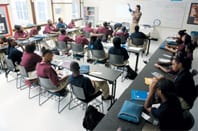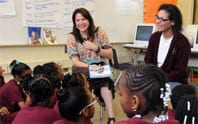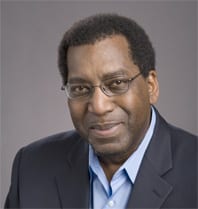Commitment to Urban Education
New Institute Integrates Education Programs and Research
The Urban Education Institute was established to integrate and expand the University’s many innovative programs that improve urban education at the prekindergarten through 12th-grade levels. The institute creates a new model for urban school improvement by integrating academic research, teacher preparation, and the development of exemplary schools at a scope and scale unmatched at other institutions.
Led by Timothy Knowles, the Lewis-Sebring Director, the institute includes the Consortium on Chicago School Research, the Urban Teacher Education Program, core functions of the Center for Urban School Improvement, and the University of Chicago Charter School, which operates four public schools on Chicago’s South Side. It works closely with the Committee on Education, the academic unit dedicated to the pursuit of multidisciplinary scholarship in education.
Donoghue Scores National Recognition for Student Gains
New Leaders for New Schools, a national organization, recognized the Donoghue campus of the University of Chicago Charter School with a $35,000 award. Donoghue was the only charter school in Illinois and one of only 11 of 99 schools in the nation to be cited for exceptionally strong student gains made on state assessment standards between 2006 and 2007. New Leaders for New Schools shares the lessons learned at Donoghue with other schools around the country. Donoghue’s mission is to prepare students for success in college.
Payne Analyzes Progress of School Reform
Despite the advantages the City of Chicago brings to school reform, the resulting changes have not always met the expectations of proponents, wrote Charles M. Payne in So Much Reform, So Little Change: The Persistence of Failure in Urban Schools. Payne, the Frank P. Hixon Distinguished Service Professor in the School of Social Service Administration and a leading scholar of school reform, provides a number of reasons school reform across the country has caused disappointment.
One of Payne’s recommendations is being discussed nationally—establish standards for the implementation of new curriculums that recognize the time and money that are needed to initiate meaningful reforms and a way to gather data that helps educators learn from the implementation. He also notes that the University-affiliated Consortium on Chicago School Research has developed a relationship with Chicago Public Schools that has led to positive changes, including reducing dropouts and increasing college-going rates.
New York Takes School Research Consortium As a Model
The University’s Consortium on Chicago School Research (CCSR) will be the model for the new Research Partnership for New York City Schools, which will begin analysis of that city’s school performance following reforms there. Start-up programs in Baltimore and St. Louis are also emulating CCSR’s approach.
CCSR is the most extensive research enterprise of its kind, working in close partnership with the Chicago Public Schools (CPS) to influence practice that directly improves the educational experience for Chicago schoolchildren. Its rich archive of quantitative and qualitative data on CPS is the largest of any urban public school system.
This year, CCSR released reports showing that ninth-grade grades and attendance were inextricably linked to high school graduation rates; analyzing why too many Chicago students do not successfully navigate the daunting process of enrolling in four-year colleges and often do not enroll or default to schools for which they are overqualified; and finding that although large amounts of class time in 11th grade are spent preparing for the ACT, the intense focus on test strategies and item practice hurts student test performance.


